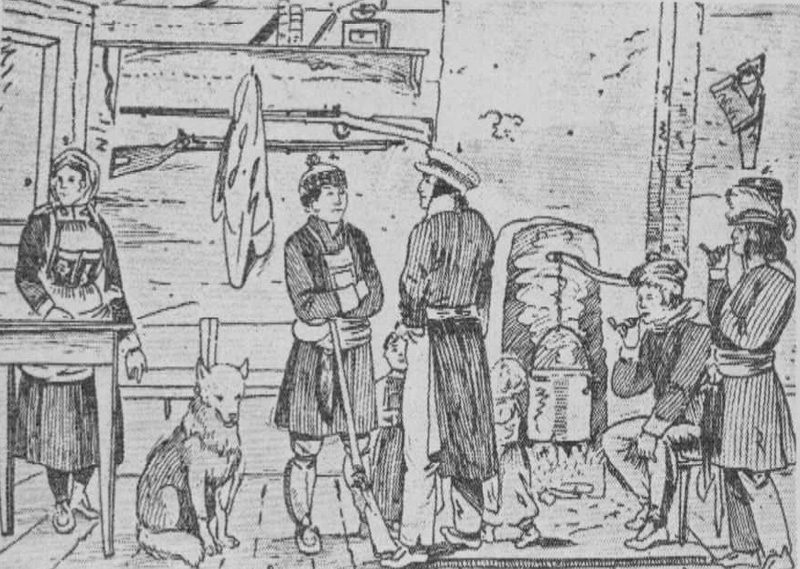
HISTORICAL EVENTS THAT TOOK PLACE ON THIS DAY IN CANADA
28 June

Red River Settlers, contemporary sketch c. 1820
Traders Threaten War
Lord Selkirk's decision to colonize the area near the junction of the Red and Assiniboine Rivers was not received warmly by either the North West Company or the Hudson's Bay Company. Both Companies hunted and traded in the Assiniboia region. They feared that a farming settlement would surely interfere with their business.
'Friction between the settlers and fur traders .soon erupted. Miles Macdonnell, appointed Governor of Assiniboia by Selkirk, was angry to see the Nor'Westers transporting bales of pemmican through his territory while many of his own settlers were starving.
Pemmican was made by pounding strips of dried buffalo meat into powder. Wild berries and melted buffalo fat were then mixed with the powder and compressed into bales weighing as much as ninety pounds. Pemmican was the most important food on the Prairies at that time.
In January, 1814, Macdonnell posted his "Pemmican Proclamation," forbidding the export of food supplies from Assiniboia. From the standpoint of the colony, his decision was beneficial, but how were the Métis and the trading companies to survive without their supplies?
Macdonnell was still not satisfied. He sent an armed party to Souris, a North West Company trading post on the Assiniboine River. There, they confiscated about 600 bales of pemmican. Macdonnell was "pushing his luck." He boasted that he would "crush all the Nor'Westers on the river, should they be SO hardy as to resist my authority."
The partners of the North West Company, meeting at Fort William, decided to destroy the Selkirk settlement. A temporary compromise was reached on June 28, 1814, but Miles Macdonnell was nevertheless terribly shaken by the enmity he had aroused. Even the Hudson's Bay Company men turned against him. Macdonnell, a discouraged, beaten man, wrote to Selkirk and asked to be relieved of his command.
Macdonnell spent his later years at his farm in Upper Canada. He died at the home of his brother in Point Fortune, Lower Canada, on June 28, 1828.
OTHER NOTABLE EVENTS ON THIS DAY IN CANADIAN HISTORY
28 June
-1776 Governor Carleton obtained an oath of allegiance from 300 Iroquois at Montreal.
-1829 The Montreal Medical Institute became the Faculty of Medicine, McGill University.
-1838 An amnesty was granted to political prisoners from the rebellions of 18371838. Some had been banished without trial but this was disallowed by Britain.
-1846 A fire at Quebec destroyed 1,300 homes; forty people were killed.
-1847 A Boundary Commission made a report on the boundaries of the St. Croix and St. Lawrence Rivers.
-1886 The first C.P.R. train left Montreal for Port Moody, British Columbia.
-1925 A reception was held at Ottawa for Field Marshal Earl Haig, British Commander-in-Chief during World War I.
-1926 The Liberal government under W. L. Mackenzie King resigned to avoid an adverse vote on a customs scandal.